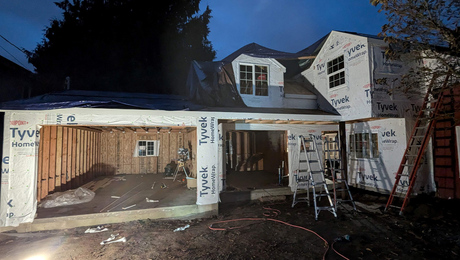I am curious to learn how one’s respective counties and or state is in adopting new codes for new building materials, building practices, and functional inspections based on new things. I first wondered about this in another thread a few weeks back when talking about PEX-based plumbing instead of copper or PVC. Someone mentioned that it was not coded in their county yet, hence not able to use.
So, here we have a material that has been around a good number of years and a county incapable of being expedient in approving material and method that is ‘new’. I wonder if anyone has done some case studies on the lethargic nature of county and or state implementation of methods and materials.
Its one thing when a builder and or a subcontractor are not willing to deviate from a tried and true material and or method for use, but its another thing to keep ‘options’ eliminated on the code level.
















Replies
"Its one thing when a builder and or a subcontractor are not willing to deviate from a tried and true material and or method for use, but its another thing to keep 'options' eliminated on the code level."
I understand your frustration but how is it different? If contractors tend ( most of them I know do) tend to go with what they know works and methods with low call back why would you think the code enforcement folks would feel any different?
I mean the first thing you hear from a homeowner is that the code is supposed to protect them so if I were in charge of codes I sure wouldn't pick out material to be approved unless I had a significant history documented for it and felt I had the ability to train the inspectors on what to look for. Just the devils advocate view. DanT
Dan, I can see your point if something is introduced in terms its never been around in any application before, but I am talking about things that have been in use for decades, but not in residential application. For instance, spray-on foam insulation has been around since the 1940's, but it took decades for local code-adoption. I think the same can be said for PEX in plumbing, too. BTW, codes don't always protect, and I can point out examples where common-sense would typically dictate code-existence where there isn't any.
But what I am more concerned with is that an adoption might occur on the state level and not a county level. Unless there is a unique case/condition, its surprising how one county codes for material or method X and another county (in the same state) doesn't. That is something that is troublesome, and I can imagine cases when adoption, and not, is good and bad.
Curious, what are your feelings on spray-on foam insualtion and PEX for plumbing? How does your county, your adjacent counties, and your state feel about them? Asking more out of example than to pick on your geographic ab/normalities.
"Curious, what are your feelings on spray-on foam insualtion and PEX for plumbing? How does your county, your adjacent counties, and your state feel about them? Asking more out of example than to pick on your geographic ab/normalities."
Well......ummmm.........errrr........I.....umm. Always a tough one to answer knowing most of the guys on this board have to jump through hoops to get work done. We have almost no codes and only one plumbing inspector for the ............county.
You need a permit and inspection in my are for water heater installs, sanitary sewer installs and septic system installs. You also need to got through the county engineer if you are digging in lawn scape area. Thats it.
If you are replacing fixture for fixture or doing electrical or carpentry no permit is needed. Ahhhh, great place to work. But man do you see some half a$$ed stuff. DanT
Oh, sorry. I use pex particularly if we are pushing through walls of older homes and I am ok with foam although I install cellulose as a business. DanT
Note that local code writing is a political process, not a technical process.
While it might be orginally written by a combination people in the code office, bulders, suppliers, etc in the end it is adopted by elected officals.
And there is often political processure applied. Often by unions to not allow some new, less labor expensive, materials.
> Note that local code writing is a political process, not a technical process.
It also depends on the size and resources of the AHJ. Big cities can afford to go their own way. Smaller places pretty much have to "buy" standard codes from the alphabet soup of UBC/ICBO, CABO, BOCA, SBCCI, etc.
Climate, topography, and soil conditions make a big difference in what things are important and what are irrelevant. San Francisco has hills and earthquakes. New Orleans has humidity and wet soil. Neither of them has the freezing winters of Fargo. What would make a lot of sense would be a set of modular codes that cities could adopt, depending on their local needs. One size will never fit all, but it should be possible to come up with a kit of pieces from which codes can be tailored. Of course, there will always be very special cases, like the parts of NO that are below sea level, that will require locally written requirements and exceptions.
As for how long it takes to change codes, the big problem is that mistakes in building codes cost big bucks, and sometimes take years to become apparant. Perhaps some places are being too slow to allow PEX. But there are other things that were accepted too quickly, like aluminum branch circuit wire and corrosive ACQ pressure treatment.
For any new idea, there are two possibilities: Allowing it could be a mistake, or forbidding it could be a mistake. Figuring out which is correct can be a lot harder than estimating the cost of each if it turns out to be a mistake. Forbid something good, and you forego some savings on material or labor in building a house. Allow something bad, and 10 - 20 years down the line you have fires, floods, structural collapse, and a whole bunch of expense to retrofit the rest of the buildings that were done that way.
-- J.S.
Re: "Allow something bad, and 10 - 20 years down the line you have fires, floods, structural collapse, and a whole bunch of expense to retrofit the rest of the buildings that were done that way."Massive failures tend to be low-probability high-loss events. Most electriciians I know have volumes of stories of extension cords so frayed they were shooting sparks. Of receptacles which had to be wiggled to make them work or, and I love this one, panels which had to be beat with a hammer to keep the lights on. All of these situations existing for months, sometimes years, without the building catching fire or anyone getting electrocuted. I'm sure you have your share.Most also have a mental file of tragedies. People or family pets electrocuted. Physical and mental injury, suffering, disability. Buildings burned. Livelihoods lost because the business went south after a fire. IMHO this suggests, as you point out, that construction methods justifiably advance slowly and conservativly. As for the thought that Codes are political I would have to, for the most part, differ. While any process dealing with humans will always have a political side. Politics being the process by which competing organizations and interest groups come to compromise. Hopefully understanding and some common ground.For the most part most codes seem to be practical and technical far more than political instruments. This seems particularly true of the NEC. I am less familiar with the other codes. I have noted, based on jobsite talk, that some of the people most convinced about the fickle nature of the codes seem to have the least understanding. Anything that seems, at a casual glance, to be arbitrary triggers ,what amount to, a conspiracy theory about political manipulations by, extra-national, union, trade groups or aliens. Whatever group is on the outs with their favorite talking head or media blowhard.The US, once a bastion of rationality, is every day becoming more like the middle east where every event, up to and including the sun coming up, is part of a conspiracy. Most of them with Israel at the center of some theoretical web.
"> Note that local code writing is a political process, not a technical process.It also depends on the size and resources of the AHJ. Big cities can afford to go their own way. Smaller places pretty much have to "buy" standard codes from the alphabet soup of UBC/ICBO, CABO, BOCA, SBCCI, etc. "None of that contridicts what I said.The code is just a recommendation until it is ADOPTED, by an elected board, state legislation or city/county goverment.And if it is comes from a national standard then it will often say something like 2004 National Code, EXPECT SECTIONS --- which are modified to only permit certain methods/materials or to allow certain methods/materials that are not in the national version.In many cases it is not poltical. I know one neighboring city that when I looked online excludes AFCI requires and adjust the max/min stair rise/run (don't remember the adjustment to see if it is more or less restrictive).And another nearby city that has while it has current versions of the code they "back dated" the GFCI's requires to about 1996 levels.I don't know the reason for eithre of those, but I guess that it more because "that is the way we have all done it".But look at Chicago where NM is prohibited and NY where cast iron is required for all drains. And cities where pex is prohibited. All agaist the national code.In areas where they write (or probably rewrite national codes) then you don't directly see the changes.
They still dont write their own code .
> None of that contridicts what I said.
Indeed not. It wasn't my intention to disagree.
Los Angeles, in the bad old pre-Andy Adelman days, had its own quirky "home made" codes. Now they're migrating to the adoption with minimal exceptions model. The exact name I don't remember, but it's something like "Los Angeles Regional Uniform Code Project". They've seen the light on standardization, a very good thing indeed.
-- J.S.
Nuke -
Your screen name, profile, and the nature of your question makes me think that you're a real nuke - lol. So was I for 20 years, so I'll take a stab at answering your question in nuke terms.
If you've ever been involved in licensing a nuclear power plant, you know that new technology is often rejected just to avoid reopening licensing hearings. Everyone "knows" that the new technology is better but who wants to risk adding years to the licensing process - or spend years in the process and having it denied.
It's very similar in the construction business. Nobody wants to be the first one to charge up the hill - they're the ones who get their arses blown away - lol.
"All codes are governed by state in mechanical. Its not a county or city thing."
No.
That might be the most common model, but not universal.
Your neighbor to the north, MO has NO STATEWIDE CODES of for anything.
The last time I saw any specifics about 2/3's of the counties did not have any codes, but that is a few years old.
So each city or county adopts whichever code that they wants, if any.
And AFAIK the county does not have any overriding "power" and when they adopt a code it is only for the unincorporated areas.
Likewise KS, and IL, and I think TX have only limited, if any, statewide codes and again the local community adopts there own.